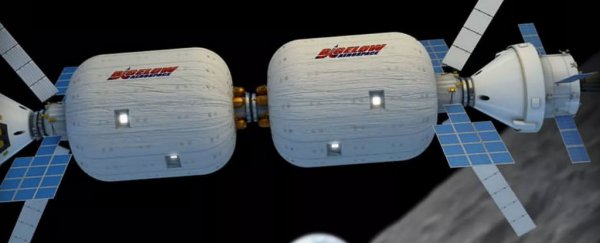Bigelow Aerospace makes inflatable space habitats, and the United Launch Alliance (ULA) launches rockets, so exciting things are very likely to happen now that the two have paired up.
They announced earlier today at the 32nd Space Symposium in Colorado Springs that they plan to launch an inflatable space hotel into orbit by 2020, and according to Bigelow, ULA's Atlas V rocket is the only spacecraft capable of launching it into low Earth orbit (sorry, SpaceX).
While NASA astronauts are the logical inhabitants of the space hotel, the companies would like to think there's a market out there for regular people to get in on that cosmic action too.
"Our hope is that NASA would be the primary customer for that structure and we'd be given permission to commercialise," said Bigelow. "Essentially, we'd be timesharing."
According to Loren Grush at The Verge, once the habitat is placed into orbit, Bigelow and ULA are angling for the likes of SpaceX and Boeing - NASA's commercial crew providers - to transport people to and from it.
If all of this is sounding a bit familiar, that's because Bigelow is already well on the way to getting inflatable habitats into space.
Just last week, it launched its Bigelow Expandable Activity Module (BEAM) to the ISS on a SpaceX resupply mission, where it will be inflated to almost twice its original size to give astronauts an additional 3.6-metre (12-feet) room to test out as a potential lunar or Martian home.
Everything that happens on the BEAM will give Bigelow invaluable data for the development of its upcoming commercial space hotel, called the B330. Just like the BEAM, the B330 will be launched into orbit as a compact module, which will be inflated at the push of a button to an impressive 330 cubic metres (12,000 cubic feet).
"That makes more overall room for crew - or what the company is calling 'amateur astronauts'," Grush explains. "The company's chief executive officer Robert Bigelow, said today the company plans to build two full-scale B330 stations by 2019. Both could be sent to space by 2020."
While details about how much the partnership between Bigelow and ULA will cost, or how ULA will fund the Atlas V launch in 2020 are still hazy - Robert Bigelow said at the symposium, "It's premature to talk in specifics about these kinds of things" - the companies are happy to speculate what a future of inflatable space hotels could look like.
"Bigelow imagines expandable habitats like the B330, which can be linked together, will become scientific research facilities, habitats on other planets and satellites, and tourist destinations," Sarah Scoles reports for Wired.
"We would love to see Disney have a Disney space station," Robert Bigelow told her. "Wouldn't that be cool?"
Yes, yes it would.
